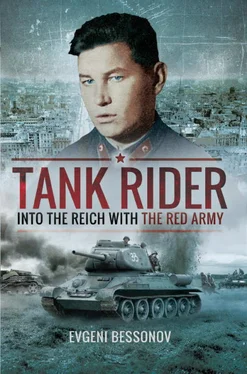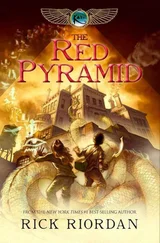The enemy’s air force rarely raided our column any more. The Red Army captured most of their airfields, and only a few airfields or highway strips remained in German hands. We mostly had to fight the ground troops of the enemy, but on 23 April the German air force did deliver a horrible strike on the Brigade’s column. Apparently, it was the Luftwaffe’s last strike, their swan song. We thought that the Germans could not employ their air force any more, but it did happen, and we suffered significant losses. The entire Brigade’s column was on the move in daytime, some companies were on tanks, others were on Studebaker trucks. The Brigade’s staff with the Brigade’s commander Colonel Turkin and his deputy (political officer) Lieutenant Colonel Skryago were also there in the column. As soon as the column entered a small forest, enemy aircraft appeared in the air. These were fighter-bombers, some ten or twelve aircraft. The planes dived, dropped their bombs and prepared for the second dive. Even before the planes appeared, an air raid alarm sounded, but it was a bit too late. The tank column stopped and we quickly dismounted the tanks, but almost no one made it away from the road. We were lucky that the Germans dropped their bombs without aiming; the bombs fell far from the road way over their target.
I had time to run just several metres from the road, when I bumped into Lieutenant-Colonel Skryago. He was also running from the road, but he apparently got exhausted and was short of breath, as he was a fat guy with a big belly. He asked me: ‘Help me, Bessonov, I do not know where my orderly is.’ Before we could make a step, a Fritz plane appeared. It flew along the road at extremely low altitude, almost hitting the treetops, and fired its machine-guns. Skryago and I just froze, we were standing there as if we were dumbstruck. We were just standing and looking at the bullets kicking up mud, and we saw those bullets hitting the dust closer and closer to us. We both thought that this was the end for us, as the fire was very dense, but a miracle happened again – the burst stopped just a few metres short. The plane soared upwards to take another dive. Yes, we were extremely lucky just before the end of the war! The Lieutenant-Colonel and I regained our senses and ran further from the road. I literally had to pull him, as he could barely move his feet. I saw two or three more or less thick trees and we lay down behind them. The air raid ended soon, but the battalion had losses. Lieutenant Colonel Skryago went to the staff, while I went to my battalion. It was good that my company did not have losses. As soon as we were about to mount the tanks, another air-raid warning sounded in the air, and numerous enemy aircraft appeared in the air. Soldiers scattered running in the forest, while I with Senior Lieutenant Anatoly Kashintsev, commander of the mortar company of the battalion, jumped into a trench right on the road. Then we ran in short rushes further and hid in another trench (apparently, the Germans had dug them even before our arrival). Suddenly a big bullet fell from the breastwork to the bottom of the trench. When I picked it up, it was still hot. We were again lucky that the bullet did not hit us; because of the noise of the air raid we had not even heard the bullet’s whistling. We decided to leave that trench as well, ran further from the road and lay down behind a tree. The soldiers also scattered in the forest. I lost my men from sight; everyone saved their lives by themselves. The air raid was awful. The planes continued their assault, dropping bombs and firing incendiary shells at tanks. German pilots dived almost to the very ground and fired their machine-guns. They fired not only at the highway, but also at the forest at the road. Planes dived in groups of three and five, firing long machine-gun bursts not only at the tanks, but also at the pinned-down infantry. I had not seen such an air raid since the Lvov battles. It is hard to say how long the raid was, but apparently it lasted at least two or three hours. Our fighters were not there, we only had one 37 mm anti-aircraft gun, but it did not help much. After the air raid we went back to our units. Both Kashintsev and I and the soldiers went to the road. We saw people standing around the bomb crater, which was on the trench where we had previously hidden and heard them talking about us. We arrived at the scene, both safe and sound. Then they started to guess who had been killed in that trench and decided that it was a truck driver. I was again lucky – intuition and luck saved my life.
We started to check the casualties. Casualties were significant, both in personnel and equipment: over ten trucks were burnt out, and several tanks were destroyed. A bomb exploded next to a T-34 tank, the tank was lifted up and crashed down with all its weight on the men that were hiding under it, while the main gun was almost torn away from the turret. After the explosion it stood vertically up from the turret. It must have been a large bomb if it had enough explosive energy to lift and move a 30-ton tank. There were dead and wounded among the tank riders, truck drivers and tank crews, and we searched the forest for the remaining dead and wounded. Luckily, in our company and in the battalion just a few were killed. Wounded were gathered next to the medical truck in order to send them to the rear – there were more wounded than dead. When we put ourselves in order and could continue the march, the column left the ill-fated forest. There was an open field in front of us, and we tried to drive across it as quickly as possible, fearing another air raid. Indeed, three Messerschmidt fighters appeared. However, the 37 mm anti-aircraft automatic gun crew set an example of courage and bravery in that situation. The crew quickly prepared the gun for fire, and when the Germans started to dive on us, they opened fire with tracer shells. The first Messer could not stand the fire and turned to the side, the other two planes also ceased their attacks. I was standing behind a Studebaker truck and saw the tracer shells flying accurately towards their target. Fighters tried to dive two or three more times, but could not take the fire from the anti-aircraft gun and flew away. Our guys did a great job; they were not afraid of the air raid and forced the German pilots to cease their attacks on the column. I should mention that during that assault the tank riders did not scatter, but stood behind the tanks and trucks, observing the duel. It was the Germans that did not have nerves or courage against our anti-aircraft crew. When the planes left, we moved forward, as we had to catch up with the schedule. I was not in the vanguard with my platoon or rather company. Sometimes the battalion commander Major Kozienko would order: ‘Bessonov – forward!’ and show me the route of advance on the map, pointing at the place for a stop and where I should wait for the main body of the battalion and the Brigade, but it happened more rarely than before.
That time company commander Nikolai Chernyshov again was absent from the company. The battalion commander called me up and gave me an order to move forward on three tanks with the company and Fedor Popov’s machine-gun platoon from battalion’s machinegun company. Tank regiment commander Stolyarov and the Brigade’s commander Colonel Turkin were also there – Turkin was back from the hospital after being wounded in February 1945 when a Panzerfaust team destroyed his APC. I really did not want to go first: I had only few soldiers let and I wanted to spare at least them till the end of the war, but I had my orders and I had to fulfil them.
We were moving forward successfully, everything was quiet, and as always ‘all of a sudden’ we were caught by enemy fire before we could reach the forest. Our tanks stopped, the tank riders dismounted. Everyone stood behind the tanks – we had to find out what was going on. The enemy was firing, mostly from small arms, from the forest on the right of the highway. We had to drive the enemy out of his positions, as the whole Brigade was about to arrive. Lieutenant Popov also dismounted his platoon, took his two Maxim machineguns from the tanks and we prepared to assault the Germans, but their positions could not be seen in the forest. We made a deal with the tank crews that they would slowly move forward, while the tank riders would use them for cover. Two soldiers were to sit on each tank in order to have a better view of the terrain and guard the tanks from Panzerfaust teams.
Читать дальше












